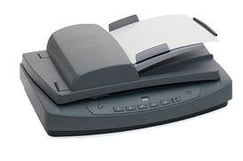EHR Implementation: Paper Chart Conversion
If you're a paper office moving to electronic health records for the first time, you're going to have a little bit of work on your hands to get through your EHR implementation. While the rewards of using an EHR are well worth it, you're going to have to put some work in to get your office up and running with your new EHR software. Do you have a plan of attack for getting all of your current paper records into your electronic system?
 You'll have a few options when it comes to scanning your paper records into your system. But, keep in mind every practice is different and there is a lot to consider before you decide the best way for your practice to move forward with your EHR implementation. You can buy a scanner yourself and self-manage the project, or you can find a third party to do the scanning for you. Depending on your needs and resources, one option might be better for you than the other. Before you decide to move forward with any option, you should talk to your EHR vendor to make sure the route you choose will work with your new system.
You'll have a few options when it comes to scanning your paper records into your system. But, keep in mind every practice is different and there is a lot to consider before you decide the best way for your practice to move forward with your EHR implementation. You can buy a scanner yourself and self-manage the project, or you can find a third party to do the scanning for you. Depending on your needs and resources, one option might be better for you than the other. Before you decide to move forward with any option, you should talk to your EHR vendor to make sure the route you choose will work with your new system.
How to Move From Paper to Electronic During Your EHR Implementation
Self-Managed Scanning
Taking on the task of scanning your paper records is a big task, but it's do-able, especially for the right practice. If you've only been in practice for a couple of years you're going to have a lot less records to scan than a practice that has been around for 10. Scanning entire charts into electronic format is going to allow you to get rid of your paper records once and for all. While you might be doing additional work, you'll never have to worry about missing information.
On the other hand, you might find that you don't need to scan every piece of a patient's paper chart to provide the best care for the patient. Keeping in mind, if you only scan partial information, you'll still have to store the remaining information somewhere in the event you need to turn to it. If you decide to just scan in certain information, this is typically done the day or week before a patient comes in for their appointment (it all depends on your routine and how you and your staff have decided to handle updating patient information into the new system). But, if you're preparing patient files the day, or week, before their appointments - it is going to require some time from your staff, and it's also going to extend your transition period to the new EHR.
When it comes to buying scanners for these purposes, there are scanners out there that are large multi-document scanners that can scan up to 75 pages a minute, or smaller single page, business card scanners. Depending on your needs, there are scanners available for you.
Third Party Solutions
If you decide that you and your staff don't have the capacity or time to handle the process of converting your paper records, there is always the option of outsourcing it to a third party company. Keep in mind, you'll want to look for a company that is specific to the healthcare industry so that you can make sure HIPAA and other security requirements are being followed. Cost of using a third party solution is probably going to be the biggest obtacle of going this route. Depending on the amount and complexity of the patient records, price will vary.
Going with a third party solution won't disrupt your daily workflow, will help keep your records more consistent, and will likely make your transition happen faster. Most third party solutions will typically work with your EHR vendor to help ensure that your new imaged data will be imported correctly with your system.
Having trouble figuring out which software solution will help make the switch from paper a smooth one? This is an example of a question you need to ask software vendors before you buy. Download our extensive list of questions to learn what else you should be asking software vendors.

